Five QE boys got to grips with cutting-edge aerospace technologies at a summer residential after triumphing in a spring competition.
 The group headed to Shropshire for the Summer Time Advanced Aerospace Residency (STAAR), at RAF Cosford, near Shifnal, and the nearby RAF Museum, learning from industry experts in a packed five-day programme.
The group headed to Shropshire for the Summer Time Advanced Aerospace Residency (STAAR), at RAF Cosford, near Shifnal, and the nearby RAF Museum, learning from industry experts in a packed five-day programme.
Head of Digital Teaching and Learning Michael Noonan said: “It was fantastic to see students take the initiative and independently apply for the STAAR programme. The five were amongst a wide cohort who applied for a place on this highly prestigious residential, and from speaking with them on their return from the holidays, I know it has only further ignited a passion in them for careers and study in STEM-related subjects.”
The organisers of the event included education technology consultancy Tablet Academy (TA) Education. After the camp, its Head of Training, Samantha O’Leary, wrote to Mr Noonan full of praise for the QE boys: “They are a funny, confident, thoughtful, and intelligent bunch who integrated incredibly well with the students from the other schools. So much so, you wouldn’t have known they were from different schools at all. They were fantastic representatives for the school, and it was a pleasure to work with them.”
 The QE five were among only 40 winners of the competition, which was open to those in Year 9 in 2022–2023. They were Keeyan Shah, Kyle Goldband, Neil Kulkarni, Keshav Aggarwal and Ishaan Mishra.
The QE five were among only 40 winners of the competition, which was open to those in Year 9 in 2022–2023. They were Keeyan Shah, Kyle Goldband, Neil Kulkarni, Keshav Aggarwal and Ishaan Mishra.
Keeyan said: “The STAAR residential was greatly enjoyable. We had an action-packed week filled with fun activities from coding a drone to flying a plane simulator. It was an amazing experience.”
Neil said: “We did quite a few activities at the residential, most of which included extremely high-tech tools. These included some things such as flight ‘sims’ and wind tunnels. We also had a chance to see roughly what living in an RAF base was like, with the mess hall and gym and things like that. Overall, it was an extremely fun, informative and unique opportunity and a highlight of our holidays.”
Keshav described the camp as a “a hands-on experience showing aerospace engineering and aeronautical design”. It was, he said, an “an eye-opening experience which will stay with me forever”.
Neil added that it was not just the academic aspects of the trip that he enjoyed: “Meeting people from other schools who had won the competition was very cool, talking about their school and just meeting new people in general. And then the residency itself – living with our friends – was very fun and the responsibilities of living without parents to help was a big realisation.”
 The competition to secure their places involved completing four STEM tasks relating to: decryption/encryption; reconnaissance; creating a CAD model, and creating a team presentation.
The competition to secure their places involved completing four STEM tasks relating to: decryption/encryption; reconnaissance; creating a CAD model, and creating a team presentation.
Organised in partnership with TA Education, the camp was sponsored by Northrop Grumman – a huge American defence and aerospace company formed by Northrop Aircraft’s 1994 acquisition of Grumman Aerospace, which built the Apollo programme’s lunar module.
The boys stayed with chaperones and followed a course delivered at both the RAF Museum and RAF Cosford by: the museum’s STEM Ambassadors; industry experts from Northrop Grumman; TA professionals and RAF STEM personnel.

 Timothy Bracey Edwards took over the headship from longstanding Headmaster Ernest Jenkins (1930–1961). After leading the School as a grammar for ten years, he then steered it through a major expansion as it became a comprehensive, which it remained during the rest of his 22-year tenure.
Timothy Bracey Edwards took over the headship from longstanding Headmaster Ernest Jenkins (1930–1961). After leading the School as a grammar for ten years, he then steered it through a major expansion as it became a comprehensive, which it remained during the rest of his 22-year tenure. Having taken German at Higher Certificate level at school (the precursor to A-levels), he was sent to Bletchley Park, where his work involved decoding German weather reports from Balkan airfields. Interviewed about his experiences in 2020 for
Having taken German at Higher Certificate level at school (the precursor to A-levels), he was sent to Bletchley Park, where his work involved decoding German weather reports from Balkan airfields. Interviewed about his experiences in 2020 for  In his new history of the School, Queen Elizabeth’s School: 1573–2023, Dr John Marincowitz (Headmaster, 1999–2011) describes Tim Edwards as “a man of his time”. An advocate of reform, he was an enthusiastic supporter of the national moves towards replacing grammar and secondary modern schools with comprehensives. QE’s first comprehensive intake arrived in September 1971 – six forms replacing the grammar school’s three-form entry.
In his new history of the School, Queen Elizabeth’s School: 1573–2023, Dr John Marincowitz (Headmaster, 1999–2011) describes Tim Edwards as “a man of his time”. An advocate of reform, he was an enthusiastic supporter of the national moves towards replacing grammar and secondary modern schools with comprehensives. QE’s first comprehensive intake arrived in September 1971 – six forms replacing the grammar school’s three-form entry.
 Diane’s association with QE extended back to 1985, when her eldest son, Andrew (Andy), joined the School, followed two years later by his brother, Chris. She quickly became involved in the work of The Friends of Queen Elizabeth’s, serving as Secretary for some 35 years, until retiring earlier this summer.
Diane’s association with QE extended back to 1985, when her eldest son, Andrew (Andy), joined the School, followed two years later by his brother, Chris. She quickly became involved in the work of The Friends of Queen Elizabeth’s, serving as Secretary for some 35 years, until retiring earlier this summer. “Over several decades, she brought great energy, vigour and dedication to all that she did, and my colleagues and I are immensely grateful for her inspiring and steadfast support.
“Over several decades, she brought great energy, vigour and dedication to all that she did, and my colleagues and I are immensely grateful for her inspiring and steadfast support. Those who have known her many years include Barrie Martin, the School’s longstanding former Chairman of Governors, who continues in his role as FQE Director. Speaking at a special event at this year’s Founder’s Day marking his retirement from the Governing Body, he credited Diane with getting him involved in the work of the Friends. This, he said, led to the then Headmaster Eamonn Harris (1984–1999) summoning him to the Governing Body.
Those who have known her many years include Barrie Martin, the School’s longstanding former Chairman of Governors, who continues in his role as FQE Director. Speaking at a special event at this year’s Founder’s Day marking his retirement from the Governing Body, he credited Diane with getting him involved in the work of the Friends. This, he said, led to the then Headmaster Eamonn Harris (1984–1999) summoning him to the Governing Body.
 Headmaster Neil Enright said: “It is always good to receive independent corroboration of our success, and this news is a testament both to the dedication and professional expertise of our staff and to the sustained hard work of our very able students, who come from a wide range of backgrounds. Our Sixth Form team are highly experienced at guiding pupils who aspire to places at the world’s leading universities and on very competitive courses, such as Medicine.
Headmaster Neil Enright said: “It is always good to receive independent corroboration of our success, and this news is a testament both to the dedication and professional expertise of our staff and to the sustained hard work of our very able students, who come from a wide range of backgrounds. Our Sixth Form team are highly experienced at guiding pupils who aspire to places at the world’s leading universities and on very competitive courses, such as Medicine.
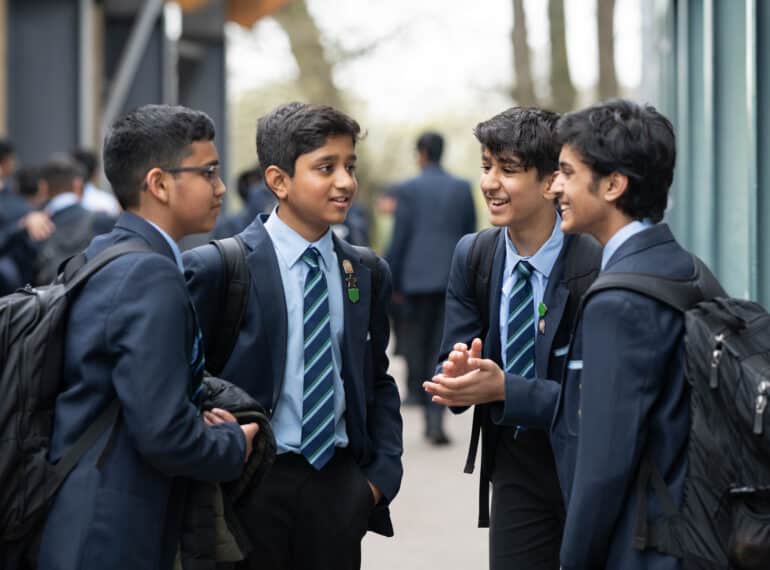
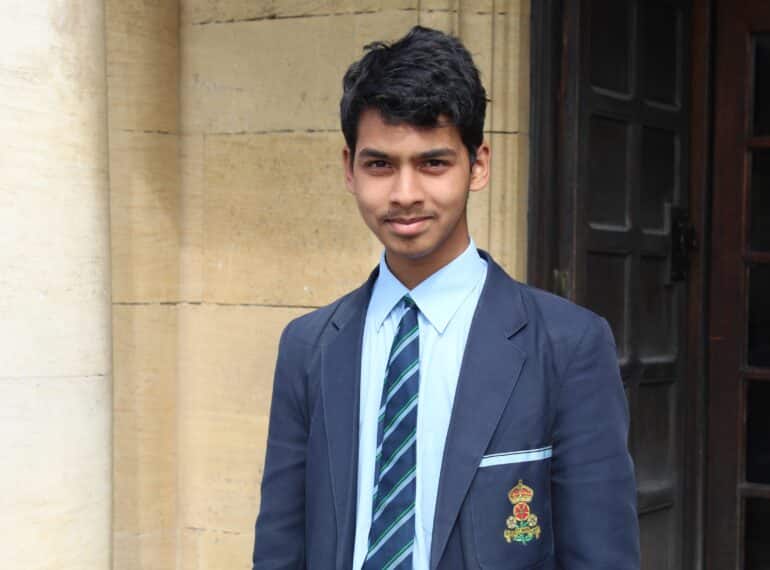
 The final round, a multiple-choice online examination with 20 questions, was more about astrophysics knowledge. To prepare, he looked at previous years’ questions and also read around the subject. The round was sat online at home, but recorded to prove there had been no cheating.
The final round, a multiple-choice online examination with 20 questions, was more about astrophysics knowledge. To prepare, he looked at previous years’ questions and also read around the subject. The round was sat online at home, but recorded to prove there had been no cheating.
 Fifty-two boys from Years 8–13 combined concerts with seeing the sights of Paris during their five-day tour.
Fifty-two boys from Years 8–13 combined concerts with seeing the sights of Paris during their five-day tour.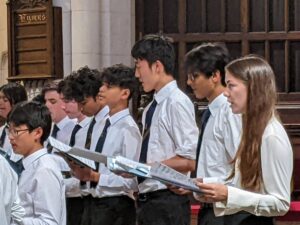 Travelling by coach and ferry, the boys’ first visit was to the Chocolaterie Beussent in Normandy, where they were told on a guided tour how chocolate is made from cocoa beans and learned the history of the small company.
Travelling by coach and ferry, the boys’ first visit was to the Chocolaterie Beussent in Normandy, where they were told on a guided tour how chocolate is made from cocoa beans and learned the history of the small company.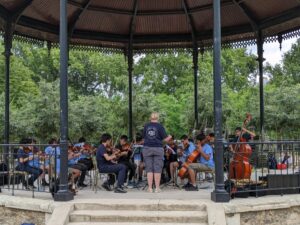 On the same busy day, they went on a walking tour, seeing the restoration work going on at Notre Dame following the disastrous fire and visiting the Louvre, Place de la Concorde, the Tuileries and the Champs-Élysées.
On the same busy day, they went on a walking tour, seeing the restoration work going on at Notre Dame following the disastrous fire and visiting the Louvre, Place de la Concorde, the Tuileries and the Champs-Élysées. On the final day, they climbed the Arc de Triomphe before setting off home, where they experienced a four-hour delay – the only hitch in the packed programme.
On the final day, they climbed the Arc de Triomphe before setting off home, where they experienced a four-hour delay – the only hitch in the packed programme.
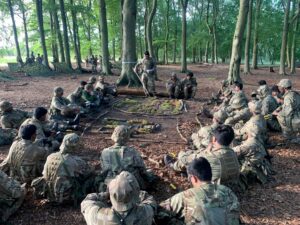 The five-day summer camp at the Barnham Training Area close to the border of Suffolk and Norfolk featured a wide variety of activities, from attacks on ‘enemy’ cadets to weapon-cleaning and administration.
The five-day summer camp at the Barnham Training Area close to the border of Suffolk and Norfolk featured a wide variety of activities, from attacks on ‘enemy’ cadets to weapon-cleaning and administration.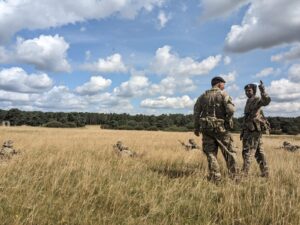 The first two days consisted of further development of section and platoon-level tactics for those cadets who had already had training, together with a ‘recruit cadre’ for those who had not had field craft and tactics training. This brought the latter group up to speed for the 24-hour ‘tactical phase’ that began one night and continued through to the following evening.
The first two days consisted of further development of section and platoon-level tactics for those cadets who had already had training, together with a ‘recruit cadre’ for those who had not had field craft and tactics training. This brought the latter group up to speed for the 24-hour ‘tactical phase’ that began one night and continued through to the following evening. All the platoons then conducted ambushes on enemy patrols to complete the exercise.
All the platoons then conducted ambushes on enemy patrols to complete the exercise.
 Four teams – two from each school – battled it out in the Galactic Challenge, which was hosted by QE. Helping out on the Saturday of the competition were a trio of Old Elizabethans who are themselves veterans of space competitions.
Four teams – two from each school – battled it out in the Galactic Challenge, which was hosted by QE. Helping out on the Saturday of the competition were a trio of Old Elizabethans who are themselves veterans of space competitions. Galactic Challenge, which is for students aged 10-14, is the sister competition of the UK Space Design Competition (UKSDC), which is for those aged 15–18.
Galactic Challenge, which is for students aged 10-14, is the sister competition of the UK Space Design Competition (UKSDC), which is for those aged 15–18.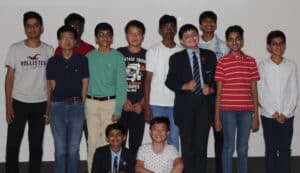 The RFP asked companies to deal with various challenges. These included:
The RFP asked companies to deal with various challenges. These included: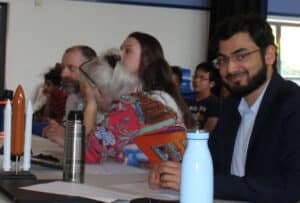 The judges’ panel featured staff from the Space Science & Engineering Foundation, QE Head of Physics Jonathan Brooke, Dr Flore Faille, Head of Physics at HBS, and Aadil Kara (OE 2010–2017).
The judges’ panel featured staff from the Space Science & Engineering Foundation, QE Head of Physics Jonathan Brooke, Dr Flore Faille, Head of Physics at HBS, and Aadil Kara (OE 2010–2017).